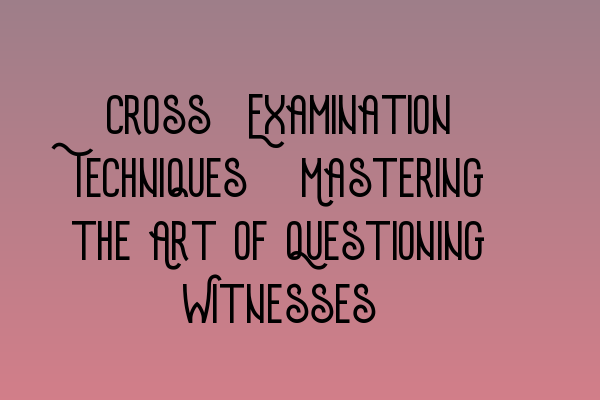Cross-Examination Techniques: Mastering the Art of Questioning Witnesses
Welcome to the SQE Criminal Law & Practice Law UK blog! In this article, we will delve into one of the most crucial aspects of criminal law – cross-examination techniques. Mastering the art of questioning witnesses can significantly impact the outcome of a case, making it a vital skill for every solicitor.
Why is Cross-Examination Important?
Cross-examination is a fundamental stage in the trial process. It allows solicitors to test the credibility of witnesses and uncover inconsistencies in their statements. Effective cross-examination can weaken the opposition’s case and bolster your own.
Within the context of the Solicitors Qualifying Exam (SQE), it is crucial to have a solid understanding of cross-examination techniques to demonstrate your expertise and proficiency to potential employers. By familiarizing yourself with these techniques, you’ll have a competitive edge in the job market.
Mastering the Art of Questioning
Successful cross-examination requires careful planning and execution. Here are some key techniques to hone:
1. Open-Ended Questions
Open-ended questions encourage witnesses to provide more detailed answers, enabling you to extract valuable information. For example, instead of asking, “Did you see the defendant at the scene?”, try asking, “What did you observe when you arrived at the scene?” This approach allows witnesses to provide a narrative, potentially revealing additional facts in your favor.
2. Leading Questions
Leading questions are designed to guide the witness towards the desired answer. However, remember to use them sparingly and strategically. Leading questions can be powerful tools, but excessive use may alienate the witness or come across as coercive. Use leading questions to highlight inconsistencies or create doubt in the witness’s testimony.
3. Impeachment Evidence
Impeachment evidence is crucial to undermine the credibility of a witness. As a solicitor, you must meticulously review all available material to identify any contradictions or prior inconsistent statements. Use documents, photographs, or witness statements to cast doubt on the reliability of the witness’s testimony.
4. Sequencing Questions
Sequencing questions involve asking a series of questions in a logical order to build a narrative. By doing so, you can guide the witness through the events leading up to the incident, aiming to expose any discrepancies or gaps in their account. This technique helps to paint a clearer picture for the judge and jury, enabling them to make a more informed decision.
5. Control the Pace and Tone
During cross-examination, it is crucial to maintain control over the pace and tone of questioning. Calmly and confidently assert your position, but avoid appearing aggressive or confrontational. A steady and composed demeanor enhances the credibility of your arguments and maintains a professional atmosphere in the courtroom.
6. Active Listening
Active listening is an essential skill during cross-examination. By carefully listening to the witness’s answers, you can identify inconsistencies or areas that warrant further exploration. Actively engage with the witness, acknowledging their responses and demonstrating your attentiveness. This approach also helps to establish rapport, which may encourage the witness to reveal more information.
By employing these cross-examination techniques, you can effectively challenge the evidence presented by the opposing party and strengthen your client’s case. Practice, preparation, and experience are key to mastering these skills.
For additional practice resources, consider exploring our SQE 1 Practice Exam Questions and SQE 1 Practice Mocks FLK1 FLK2 articles. These valuable resources will help you test your knowledge and enhance your understanding of criminal law and the specific requirements of the SQE exams.
Conclusion
Cross-examination is an art that requires a deep understanding of legal principles, impeccable preparation, and excellent communication skills. By mastering the techniques discussed in this article, you will gain a competitive advantage in your legal career and be better equipped to zealously represent your clients.
For comprehensive SQE 2 preparation courses and SQE 1 preparation courses, visit our website and explore our offerings. You can also stay updated with the latest SRA SQE exam dates to plan your study schedule effectively.
Thank you for reading, and we hope this article has provided valuable insights into the art of questioning witnesses in cross-examination.
